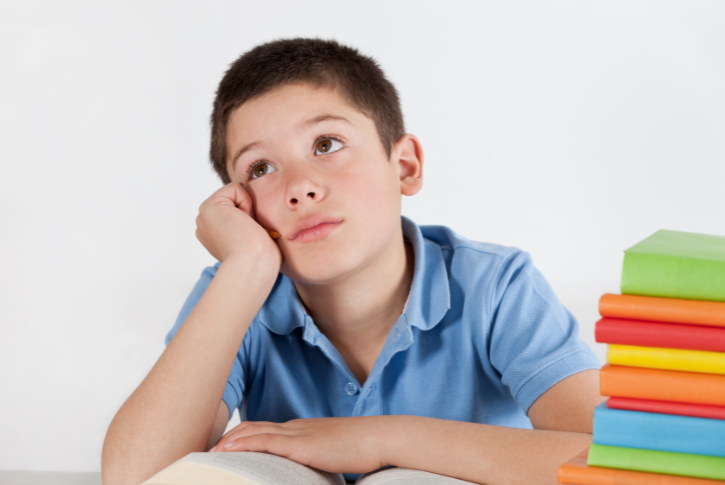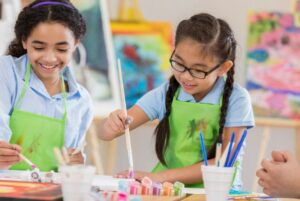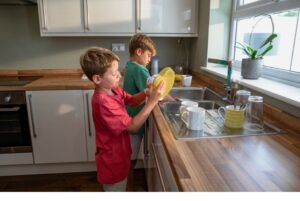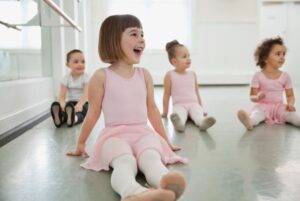Parenting a child with ADHD isn’t easy — and in Tennessee, where access to behavioral specialists can be limited by geography or cost, it can feel even harder. Whether you’re navigating long waitlists for evaluations, trying to advocate for your child at school, or just hoping to get through homework without a meltdown, you’re not alone.
ADHD — short for Attention-Deficit/Hyperactivity Disorder — affects nearly 10% of children in the U.S., according to the CDC, and its symptoms go far beyond being “hyper” or “distracted.” Kids with ADHD often struggle with big emotions, impulsive decisions, restless energy, and trouble staying organized — all of which can create stress for the whole family.
But here’s the good news: medication isn’t the only way to support your child’s success. In fact, Tennessee experts say that simple, structured activities — especially ones that engage the body, mind, and emotions — can dramatically reduce symptoms and help kids build focus, confidence, and coping skills.
“ADHD is a lifelong neurological disorder and cannot be cured, but there are several ways to treat the symptoms — such as diet, coping skills, behavioral therapy, and physical activity,” explained TN Voices, a statewide advocacy and support group for families.
In this guide, you’ll discover non-medication strategies that are fun, practical, and perfect for Tennessee families. Each idea targets a specific ADHD challenge and offers real-life ways to help your child thrive right where you are.
Let’s explore some ADHD-friendly activities that can make daily life calmer, happier, and more connected — for both you and your child.
Activities to Support Children with ADHD
Practical ways to help your child focus, manage emotions, and thrive—without medication
Each of the following activities was selected to target the common challenges children with ADHD face — like impulsivity, hyperactivity, inattention, and difficulty with emotional regulation. These aren’t just fun diversions; they’re powerful tools for building self-esteem, developing executive function skills, and promoting calm.
1. Physical Activities – Channeling Energy and Boosting Focus
Why it helps: Children with ADHD often struggle with hyperactivity and emotional regulation. Movement-based activities like martial arts, swimming, or even long walks in the Smokies provide an outlet for excess energy and naturally increase dopamine—the neurotransmitter often lacking in kids with ADHD. Physical activity can also improve sleep and reduce anxiety.
Try this in Tennessee:
- Enroll your child in a taekwondo or karate class — many dojos across Tennessee offer beginner programs that emphasize self-control and discipline.
- Explore kid-friendly hiking trails in the Great Smoky Mountains, like Laurel Falls or Porters Creek.
- Join a local YMCA swim team or community soccer league.
Connects to challenges:
- Hyperactivity: Structured movement helps regulate energy.
- Impulsivity: Sports with clear rules teach turn-taking and self-control.
- Emotional Regulation: Exercise reduces frustration and mood swings.
2. Creative Outlets – Focus Through Expression
Why it helps: Kids with ADHD may struggle to communicate their feelings, leading to outbursts or withdrawal. Art and music are powerful tools for emotional expression, focus, and patience. These activities also boost self-esteem by giving your child a tangible sense of accomplishment.
Try this in Tennessee:
- Visit Dolly Parton’s Imagination Library for themed art inspiration, then let your child illustrate their favorite book.
- Sign up for a music or theater class at a community arts center like the ones available in Memphis or Chattanooga.
- Set up a daily art table at home with sketch pads, clay, or watercolor kits.
Connects to challenges:
- Inattention: Engaging, hands-on tasks encourage sustained concentration.
- Emotional Regulation: Art provides a safe outlet for emotions.
- Self-Esteem: Completing a creative project builds confidence.
3. Structured Routines – The Magic of Predictability
Why it helps: Children with ADHD thrive on consistency. Predictable routines reduce decision fatigue, prevent meltdowns, and help them mentally prepare for transitions. A structured day makes it easier for them to remember expectations and follow through on tasks.
Try this in Tennessee:
- Use a dry erase board or printable visual schedule featuring local school mascots or Tennessee-themed images.
- Start each day with a “morning checklist” and wind down with an evening “bedtime board.”
Connects to challenges:
- Inattention: Clear steps keep kids on track.
- Impulsivity: Routines reduce chaos and unpredictable behavior.
- Emotional Regulation: Knowing what to expect calms anxiety.
4. Mindfulness and Relaxation – Calming the Mind
Why it helps: Kids with ADHD often feel like their brains are running on high speed. Mindfulness exercises like yoga, breathing techniques, or guided imagery teach them how to pause, notice their thoughts, and regain control in moments of stress or impulsiveness.
Try this in Tennessee:
- Attend a kids’ yoga class at a wellness center in Knoxville or Franklin.
- Use apps like GoNoodle or Smiling Mind for short, fun mindfulness breaks at home.
- Try “cloud watching” in your backyard or a state park—ask your child to describe what they see and breathe slowly as they do.
Connects to challenges:
- Impulsivity: Practicing stillness teaches delay and thoughtfulness.
- Emotional Regulation: Breathing exercises reduce frustration and anger.
- Hyperactivity: Mindfulness creates calm body awareness.
5. Interactive Games – Building Executive Function
What is executive functioning?: Christen Holder, PHD’s article “Organized and On Time: Tips for Executive Functioning for Kids” from Le Bonheur’s Practical Parenting blog describes executive function as:
“Executive functioning refers to a group of brain skills that direct and organize our behavior – like the “conductor” of the brain. The brain uses this group of skills to make plans and organize what we are going to do and to set goals for ourselves and get started on a task. We also use these skills to carry out our goals and plans by strategizing how to accomplish a task, paying attention, monitoring our performance, stopping impulses and managing our time and space.”
While all children may struggle at times with executive function, children with ADHD struggle in this area more often and it continues to be an issue as they reach adulthood. Holder says: “some kids just develop in this area more slowly! Unfortunately for these kids they are often seen as underachievers, or can be labeled as ‘lazy’ by those who work with them. However, sometimes kids struggle with executive functioning because they have a medical condition, such as attention-deficit/hyperactivity disorder (ADHD), which affects how well they can use certain executive functions.”
Why it helps: Board games and card games aren’t just for fun—they develop executive function skills like planning, working memory, and emotional control. They also require turn-taking, rule-following, and perseverance, which are all essential life skills for children with ADHD.
Try this in Tennessee:
- Visit local toy stores like Phillips Toy Mart in Nashville to find ADHD-friendly games like Rush Hour, Uno, or Jenga.
- Play Tennessee trivia games to engage both brain and state pride.
- Try memory match games with cards that feature Tennessee wildlife or landmarks.
Connects to challenges:
- Inattention: Games require sustained focus and attention to detail.
- Social Skills: Playing with others builds patience and cooperation.
- Impulsivity: Waiting turns and handling loss help regulate behavior.
Tips and Tricks
- Positive Reinforcement: Celebrate successes, no matter how small, to build confidence.
- Break Tasks into Steps: Simplify instructions to prevent overwhelm.
- Use Timers: Set time limits for tasks to maintain focus.
- Create a Quiet Space: Designate an area free from distractions for homework or calming down.





